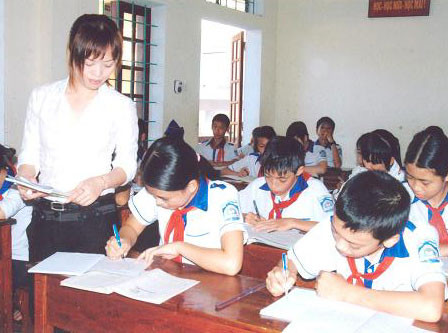About choosing classes and schools: Final article - Need for transparency in input quality
The guiding viewpoint of the Nghe An Department of Education and Training for many years now is that there are no specialized schools or selective classes. However, in order to focus on improving the quality of key subjects, schools, especially middle and high schools, have long implemented student classification.
Mr. Luong Ngoc Son - Principal of Quynh Luu 1 High School said: We do not establish selective classes, but need to classify students to have appropriate teaching methods for each group. For example, students studying natural sciences with high test scores will be placed in classes A1, A2, the rest will be divided equally into classes. The same goes for teachers, through each school year based on the criteria for evaluating and classifying excellent, good, average teachers, then based on experience and pedagogical skills to divide classes to support each other to improve the quality of key subjects as well as general quality".

A class at Hung Loc Secondary School (Vinh City). Photo: Dinh Nhat
With that approach, last school year the school had 22/28 students winning the provincial excellent student award. Especially in the 2011 university entrance exam, there were 9 turns (8 students) of students who scored 27 points or more, including Hoang Xuan Tuan Anh who passed 2 schools with 29.5 points and 28 points. And these students are concentrated in class 12A2, headed by Ms. Duong Thi Chau Luu.
Classifying students is necessary because students with good academic performance have a certain level of awareness, equivalent to each other, so teaching the same group of students will be more effective. Ms. Minh Hong, a teacher at Huynh Thuc Khang High School, said: "Selective classes are only effective when the students' levels are even so that teachers can apply teaching methods with higher requirements than normal classes. If there are many different levels in a class, it will be "difficult" for both teachers and students.
The effectiveness of classifying students according to their level is clearly shown through the district and provincial excellent student exams, and the university and college entrance exams that schools call spearheads. However, in the years of implementing the campaign, "not letting students sit in the wrong class", classifying students also helps many schools to be more convenient in assigning teachers to teach extra classes, both at home and at school for weak students. Thus, classifying students is not only done in urban schools, plains, and areas with a tradition of studiousness, but is also done by most junior high schools and high schools in the whole province. However, if in mountainous areas, the entrance exam for the first level is smooth and peaceful, then choosing the first level class in the city and towns is the number one concern of parents.
Mr. Tran Van Nghe - Principal of Co Do High School, Nghia Dan said: "To be admitted to the key classes, students often have to have high academic results, taken from top to bottom in the transfer exam or quality survey at the beginning of the year. Students who are qualified to enter the selective class based on their actual ability are called "clean classes" by many teachers and students.
Because of the outstanding advantages of the advanced class, many parents really want their children to study in that class environment to "be near the light, the light will shine". From there, they find every way to get their children a "place" in the selective classes. That's why after high schools announce the admission scores, the school's board of directors and even teachers are afraid to answer the phone, afraid that acquaintances will come to their homes to ask for help in choosing a class or asking for a class for their children.
However, due to the heat of the elite class, out of respect, familiarity, and "external relations", the school has "flexibly" placed some students who are not "qualified" enough to study in the elite class. The "competition" in the elite class environment is to some extent a motivation for students to have more will to strive in studying, training, and cultivating. But it will be a psychological pressure for students who are not capable but are still "forced" by their parents to study in the elite class. They have many difficulties in receiving the amount of knowledge that is often "heavier" than in normal classes. Not being able to keep up makes them self-conscious, stressed, which affects their psychology, learning and training results, and the whole group.
I think that while the education sector is gradually striving towards the goal of real teaching, real learning, and real quality, it is extremely necessary to make the input quality of key classes transparent. Schools must put the interests of students first and have an objective and impartial view to classify qualified students into key classes. Because, more than anywhere else, the school environment always needs to be clean.
Thao Nhi






